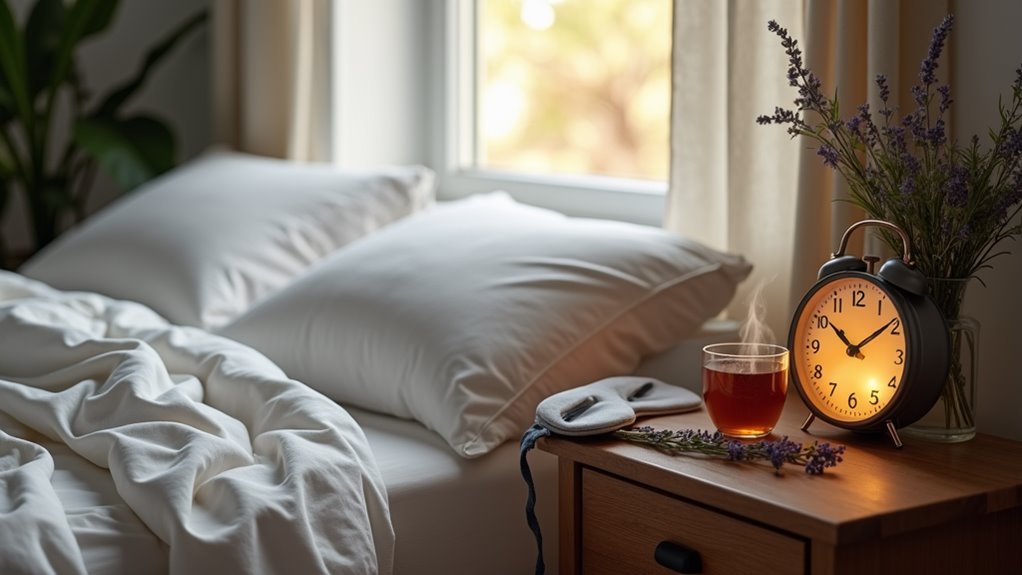Sleep Like a Baby- 7 Natural Remedies to Cure Insomnia!
You can overcome insomnia naturally by creating the perfect sleep environment with optimal temperature and darkness, drinking calming herbal teas like chamomile, and practicing mindful meditation. Focus on proper nutrition by limiting caffeine and eating sleep-promoting foods rich in magnesium and tryptophan. Establish consistent sleep habits, try the 4-7-8 breathing technique, and track your sleep patterns. Discover how these science-backed remedies can transform your nights.
Understanding the Root Causes of Insomnia
Before you can effectively treat insomnia, you need to identify what’s keeping you awake at night. Common triggers include stress, anxiety, irregular sleep schedules, and poor sleep hygiene. You’re not alone – millions of people struggle with these same challenges when trying to get quality rest.
Your lifestyle choices play a crucial role in sleep patterns. That afternoon coffee, evening screen time, or late-night workout could be disrupting your natural sleep cycle.
Even your bedroom environment matters – temperature, noise levels, and lighting can make or break your sleep quality.
When exploring natural sleep remedies, understanding your personal sleep disruptors is essential. Keep a sleep diary to track your habits, noting what you eat, drink, and do before bedtime. Natural solutions can help align with your body’s innate rhythms, promoting sustainable quality rest.
Many people discover that their insomnia stems from easily fixable habits rather than serious medical conditions. By identifying your specific triggers, you’ll be better equipped to choose the right solutions for your sleep struggles.
Calming Herbal Teas and Natural Supplements
While prescription sleep medications can be effective, many people prefer starting with gentler natural alternatives like herbal teas and supplements. You’ll find these natural remedies can help calm your mind and prepare your body for restful sleep without harsh side effects. Incorporating relaxation techniques such as deep breathing exercises can enhance the effectiveness of these remedies.
| Tea/Supplement | Benefits | Recommended Timing |
|---|---|---|
| Chamomile | Reduces anxiety, promotes relaxation | 1 hour before bed |
| Valerian Root | Improves sleep quality, decreases time to fall asleep | 30-60 mins before bed |
| Magnesium | Relaxes muscles, regulates sleep hormones | With evening meal |
Start with one cup of calming tea in the evening as part of your wind-down routine. If you’re considering supplements, begin with a low dose and monitor how your body responds. You’ll want to try each remedy individually to determine what works best for you. Remember to consult your healthcare provider before adding any new supplements to your routine, especially if you’re taking other medications.
Creating the Perfect Sleep Environment
Your sleep environment plays a crucial role in achieving quality rest each night. Think of your bedroom as a sleep sanctuary where you can fully relax and unwind.
You’ll want to keep the temperature between 60-67°F (15-19°C), as your body naturally cools down when preparing for sleep.
Make sure your room is as dark as possible by using blackout curtains or an eye mask. Even small amounts of light can disrupt your body’s natural melatonin production.
Consider using a white noise machine or earplugs to block out disruptive sounds that might wake you.
Your mattress, pillows, and bedding should feel comfortable and supportive. Choose breathable fabrics like cotton or bamboo, and replace pillows every 1-2 years.
Remove electronic devices from your bedroom, as their blue light and electromagnetic fields can interfere with your sleep patterns.
You’ll notice a significant improvement in your sleep quality once you’ve optimized your environment.
Mindful Meditation and Breathing Techniques
Once you’ve set up your ideal sleep environment, practicing mindful meditation and breathing exercises can further calm your racing mind before bed.
Join thousands of others who’ve discovered the transformative power of mindfulness for better sleep. Start with a simple 4-7-8 breathing technique: inhale for 4 counts, hold for 7, and exhale for 8. You’ll feel your body naturally relax with each breath.
For meditation, find a comfortable seated position and focus on your breath for just 10 minutes. When thoughts arise, acknowledge them without judgment and gently return your attention to your breathing.
You’re not alone in this journey – many people find that regular meditation reduces anxiety and improves sleep quality. Try using guided meditation apps that connect you with a community of mindful sleepers. Additionally, incorporating relaxation techniques such as progressive muscle relaxation can further enhance your sleep experience.
Exercise and Physical Activity for Better Sleep
Regular physical activity serves as a powerful natural sleep aid, helping to regulate your body’s circadian rhythm and reduce nighttime restlessness.
When you exercise consistently, you’ll notice improved sleep quality and find it easier to drift off at bedtime.
To maximize the sleep-enhancing benefits of exercise, follow these key strategies:
-
Time your workouts at least 3-4 hours before bedtime, as evening exercise can be too stimulating and interfere with your natural wind-down process.
-
Aim for 30 minutes of moderate aerobic activity daily, like brisk walking, swimming, or cycling – activities that get your heart pumping without being overly intense.
-
Include strength training 2-3 times per week to reduce muscle tension and promote deeper, more restorative sleep.
-
Get outside for morning exercise when possible, as natural sunlight exposure helps anchor your sleep-wake cycle.
Establishing a Consistent Bedtime Routine
Creating a consistent bedtime routine signals to your body that it’s time to wind down, making the transition to sleep smoother and more predictable. You’ll want to start your routine about an hour before bed, giving yourself time to decompress from the day’s activities.
Your bedtime routine should include calming activities that help you relax. Here’s a simple guide to structure your evening:
| Time | Activity | Benefits |
|---|---|---|
| 1 hour before | Digital sunset | Reduces blue light exposure |
| 45 mins before | Warm bath/shower | Lowers body temperature |
| 30 mins before | Light stretching | Releases muscle tension |
| 15 mins before | Meditation/reading | Calms racing thoughts |
| Bedtime | Lights out | Maintains circadian rhythm |
Incorporating mindfulness techniques into your wind-down routine can further enhance relaxation and prepare your mind for restful sleep.
Diet and Nutrition Tips for Quality Sleep
While bedtime routines set the stage for quality sleep, what you eat and drink throughout the day plays a major role in your sleep patterns. You can join countless others who’ve discovered that making simple dietary adjustments helps them drift off naturally and wake up refreshed.
-
Limit your caffeine intake to morning hours only – coffee, tea, and chocolate can disrupt your sleep even 8 hours after consumption.
-
Choose sleep-promoting foods rich in tryptophan, magnesium, and melatonin like turkey, bananas, almonds, cherries, and leafy greens.
-
Stay hydrated during the day but reduce liquids 2-3 hours before bed to prevent midnight bathroom trips.
-
Time your meals wisely – eat dinner at least 3 hours before bedtime and avoid heavy, spicy, or acidic foods that can cause discomfort.
Incorporating iron-rich foods into your diet, such as spinach and lentils, may also contribute to better sleep quality.
If you’re struggling with insomnia, these nutrition strategies can help you join the ranks of natural, restful sleepers.
Frequently Asked Questions
Can Certain Medications Interfere With Natural Sleep Remedies?
You’ll want to check with your doctor since medications can interact with natural sleep remedies. Some combinations might reduce effectiveness or cause unwanted side effects in your body.
How Long Does It Typically Take for Natural Sleep Remedies to Work?
You’ll find natural sleep remedies typically take 30-60 minutes to work. For best results, start your bedtime routine early and use them consistently for 2-3 weeks.
Are Natural Sleep Remedies Safe During Pregnancy and Breastfeeding?
You’ll need to check with your healthcare provider before trying any sleep remedies during pregnancy or breastfeeding, as some natural ingredients can affect your baby’s development and safety.
Can Children Use These Natural Remedies for Sleep Problems?
You’ll want to consult your pediatrician before giving any sleep remedies to children, as their dosages and safety needs differ significantly from adults, even with natural options.
What Are the Potential Side Effects of Long-Term Natural Sleep Aid Use?
You’ll want to monitor long-term natural sleep aid use since it can lead to dependency, morning grogginess, changes in your sleep patterns, and potential interactions with medications you’re taking.





